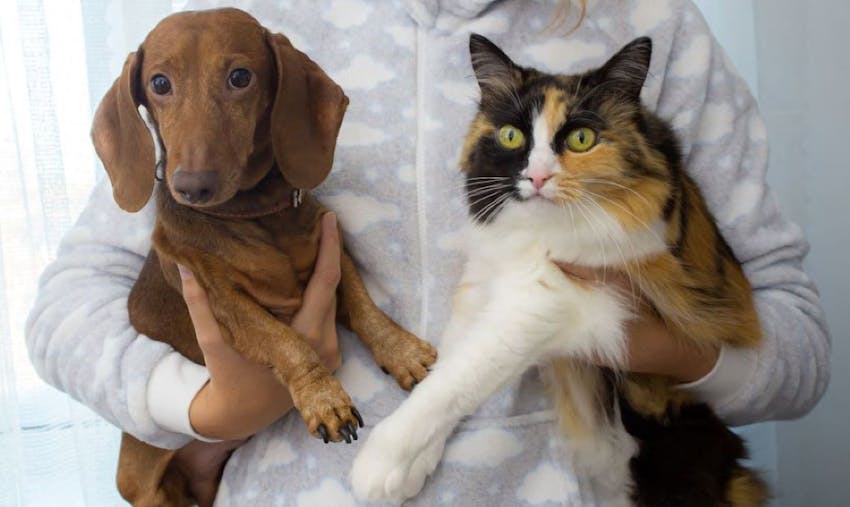Ready to help treat your pet to a healthy life?
The Best New Year’s Resolutions for Dogs & Cats in 2026
By : Trupanion Staff | Updated Dec 29, 2025

Looking forward to all the things you'll do in 2026? What about your pet? A lot of people set specific goals or “resolutions” for the New Year, from adopting healthier habits to seeing more of the world. But while your pet may not be finally planning that trip to Europe, they too can have New Year’s resolutions. All they need is a little help from you!
Just like humans, dogs and cats can benefit from positive changes and improvements in their lives. The start of a new year is a great time to set specific goals with pet health and well-being in mind. Since our animal friends can’t grab a pen and put paw to paper, we’ve decided to be helpful humans and write up a list of the best New Year’s resolutions just for them. Let's dive deeper into the importance of New Year's resolutions for pets and how you can create a healthier and happier lifestyle for your furry friend.
Benefits of setting New Year's resolutions for pets
While setting New Year's resolutions for pets may not be a common practice, there are certain aspects of pet care that can benefit from intentional goals and attention. Here are three reasons why creating a list of New Year's goals for your pal can be important for their overall health and wellness:
- Enhanced well-being — Establishing resolutions for your pet's health and happiness contributes to their overall well-being. Addressing aspects such as diet, exercise, mental stimulation, and preventive care ensures that your pet enjoys a healthier and more fulfilling life. Regular veterinary check-ups, proper grooming, and a balanced diet all contribute to their physical and mental health.
- Prevention and early detection of health issues — Yearly pet resolutions focused on preventive care, such as scheduled veterinary check-ups and keeping a healthy weight, can do more than just maintain your pal's everyday wellness. Consistent goals in these areas can help you become better attuned to what's "normal" for your pet and contribute to the early detection of certain health conditions. This in turn leads to more effective treatments and interventions, ultimately improving your pet's quality of life and longevity.
- Strengthening the human-pet bond — Setting resolutions for your pet involves intentional interaction and care. Whether it's through daily walks, playtime, or training sessions, these activities strengthen the bond between you and your pet. Spending quality time together not only benefits your pet but can also foster a sense of companionship and loyalty for the rest of 2026 and the years to come.
By setting New Year's resolutions for your pets, you demonstrate a commitment to their well-being and happiness. These resolutions provide a framework for responsible pet ownership, helping you prioritize the various aspects of care that contribute to healthy and fulfilling lives for dogs and cats.

11 best New Year’s resolutions for dogs and cats
We may not know exactly what our pets have planned for the next 12 months, but as humans we can do our part to help them achieve better mental and physical well-being this year. Here’s a list of healthy New Year’s resolutions for cats and dogs alike in 2026, plus tips for pet owners to make them happen.
1. Catch up on veterinary care
Most dogs and cats aren’t exactly stoked to go to the vet, but we all know that routine visits are vital for their health and wellbeing. Now’s a great time to review your pal’s health history and ensure they’re current on checkups and vaccines. If it’s been a while since their last wellness appointment or you can’t remember when they’re due for another one, go ahead and call their veterinarian to ask.
While you're at it, consider getting pet health insurance if you haven't done so already. Having a good plan in place helps to ensure your pet can receive the best treatment in the event of unexpected illnesses and injuries (by protecting your pet with insurance, you also protect your budget for their health care).
Learn how often to take pets to the vet.
2. Try a new activity
Cats and dogs often thrive on routine, but that doesn’t mean they can't get bored! Shaking things up every once in a while helps pets of all ages stay active and engaged in both body and spirit.
So, this year, try exploring new places and/or teaching your pet new tricks. Engage your pal's mind with a new activity, whether it’s navigating a homemade obstacle course or scavenger hunt, checking out a new puzzle toy, or exploring a park they’ve never been to before. There are so many possibilities!
3. Shed the extra fluff
Looking to reach a healthier weight in the New Year? Consider including your dog or cat. Losing weight is consistently one of the most common New Year's resolutions among humans, but it can be just as beneficial for pets. The truth is that carrying excess weight puts animals at increased risk of heart disease, hypertension, diabetes, and a wide range of other illnesses.
If you’re concerned about your pet’s pounds, it’s a good idea to set up an appointment with their veterinarian to discuss what a healthy weight is for their frame and breed, and how to help them reach it safely. The good news is that there are far less gimmicks and "fad diets" promising weight loss for dogs and cats than there are for humans. Instead of navigating through a sea of dieting products and programs, the best course of action to help pets lose weight is usually quite simple: adopting the right amount of daily exercise and food portion control.
4. Focus on dental health
Pet oral health has been increasingly shown to play a vital role in the overall well-being of our furry companions. Dental issues in pets can lead to severe health problems, including infections, pain, and a decline in their quality of life. Routine dental care for dogs and cats is essential for preventing conditions such as periodontal disease, gingivitis, and tooth decay.
Pet owners can promote oral health by incorporating regular brushing into their pets' routines, providing veterinarian-approved dental treats and toys, and scheduling professional dental cleanings with your vet team. Prioritizing pet dental health in 2026 is an investment in your pal's overall health and longevity for years to come.
5. Make new friends
Setting up puppy playdates and visits to the local dog park are great for dogs who enjoy socializing. Just make sure they’re current on their vaccines first, and be sure to supervise all interactions for safety.
While cats can enjoy kitty playdates, never force socialization on those who are unaccustomed to it. For cats who prefer being solo, meet their enrichment needs by playing with them more often and introducing some new toy “friends” to your home.
6. Take many naps
Snooze time is a major part of life for cats and dogs alike, and there’s little doubt your pet will want to spend a good chunk of 2026 catching up on some zzz’s. Just as with humans, quality sleep is vital for a pet's mental and physical health. You can help by setting up plenty of clean, cozy spots around the house for your pal to curl up in.
Wondering how much sleep dogs and cats actually need? According to veterinarians, dogs sleep an average of 12 hours a day while cats snooze an average of 15. Your pet’s age and breed type will also factor in to how much sleep they need day-to-day.
7. Earn all the treats
If pets could talk, they’d almost certainly say, “I’m going to get all the treats this year.” While we’d love to help them fulfill their wild dreams, it’s important to ensure they’re staying healthy. Ask their vet how many treats a day is okay for your dog or cat, and keep in mind that dietary requirements also depend on breed, age, and size. For healthy pet treats, look for ones that have minimal ingredients (no grain fillers, for example) and are low in calories.
8. Get tons of playtime
When it comes to pets, playtime is the best time! And it’s not just about fun — regular playtime provides an important outlet for energy and stress in pets. In doing so, hours of play every day also helps dogs and cats be calmer and better behaved.
Pets often engage themselves in play, but human participation means quality time for both you and your pal. Be sure to set aside time every day to play with your pet, whether it’s throwing a toy around for them, starting a game of chase, challenging them in tug o’ war, etc.
9. Stay fresh and clean
Okay, so maybe your pet thinks they smell great even when your nose tells you otherwise. But whether they appreciate it fully or not, regular grooming contributes to a pet’s overall wellness. Routine baths and combing help keep your pal’s skin and coat clear of dirt, dust, chemicals, fungus, and other things that may be detrimental to their health.
While dogs tend to receive rinses more often, cats sometimes need baths as well. If you’ve never bathed your kitty before, asking your veterinarian for some tips is a great place to start.
10. Clean out old toys
Pets can have clutter build up too! And beyond just creating a mess, old and broken toys can result in injury to your pet. Having too many toys out at once can likewise cause unnecessary stress for dogs and cats, making it tough for them to decide which one to play with at a time or even just relax in the home.
Now’s a great time to go through your pal’s possessions and toss anything that’s broken or just isn’t getting used. If something is in great condition but your pet just doesn’t have any interest, consider donating to a local animal shelter or animal welfare organization.
11. Update pet ID info
A pet’s ID information is one of the best tools for helping them return home when lost. If you’ve moved at all since welcoming your pal into your life, take this time to double check their identification information and ensure it is up to date. If your pet isn’t microchipped yet, consider doing so as physical tags and collars can be easily taken off. If you're planning on taking any trips with your pet this year, having updated identification for them will be even more necessary.

Prioritize your pet's health this year
While pets may not make resolutions themselves, you know just how important their well-being and happiness are. As you determine which pet New Year's resolutions are right for you and your pal, now's a great time to assess their health history, their breed and genetic risks, and your plan for veterinary emergencies. Surprise illnesses and accidents can happen to any pet and can result in huge medical bills. Not being able to predict these situations makes it difficult if not impossible to budget for them, so add "sign up for a good pet health insurance plan" to your own list of resolutions for 2026. Learn more about how pet insurance works to get started.
Remember, every dog and cat is unique. The resolutions you set for your pet can be adapted based on their individual needs, age, and health status. Always consult with your veterinarian for more personalized advice tailored to your pet.
Want to stay on top of all things dog and cat throughout the year? Sign up for our newsletter and get useful pet care tips delivered straight to your inbox!
